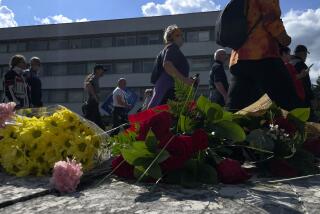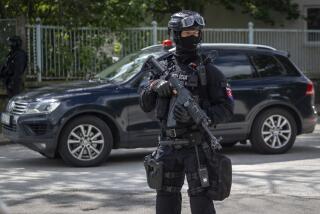Yugoslavia’s Defense Chief Assassinated
VIENNA — A man firing a Kalashnikov assault rifle killed Yugoslav Defense Minister Pavle Bulatovic on Monday night as he dined in a Belgrade restaurant surrounded by military and secret police buildings.
Just hours after the slaying, Yugoslavia’s government went into emergency session for the first time since the North Atlantic Treaty Organization launched airstrikes against the country last March.
Military police wearing armored vests sealed off the area to traffic. No arrests were reported Monday night.
Although the Yugoslav capital is notorious for its many high-profile killings of politicians, police, mob bosses and at least one suspected war criminal, Bulatovic was the most senior official assassinated since Slobodan Milosevic, now Yugoslavia’s president, rose to power in 1987. Few of the cases have been solved.
Coming so soon after the Jan. 15 slaying of indicted war criminal Zeljko Raznatovic, a Serbian gangster and paramilitary leader known as “Arkan,” Bulatovic’s death again fueled speculation that Milosevic might be trying to eliminate close allies who have detailed knowledge of alleged war crimes.
But Bulatovic is a Montenegrin and a top official in the Socialist People’s Party, the main opposition to Montenegro’s pro-Western government. This position might have made Bulatovic a target of political retribution.
Tensions between Serbia and Montenegro, the two republics in what remains of Yugoslavia, have increased in recent months. Montenegrin President Milo Djukanovic repeatedly has threatened to declare independence, while Milosevic has warned him not to dare deliver the final blow to the Yugoslav federation.
After independent Serbian media broke the news of Bulatovic’s killing, state-run television read a brief government statement that said: “With sorrow and sadness, we announce that Defense Minister Bulatovic has died. He is a victim of a classic terrorist act.”
Vuk Obradovic, an army major general and director general of the state-owned Ju-Garant bank, which handles the Yugoslav military’s finances, was slightly injured in the attack, along with the restaurant’s manager, Mirko Knezovic.
Although Bulatovic was a close political ally of Milosevic, he was not considered a key player in the military chain of command and was not publicly accused of war crimes by the International Criminal Tribunal for the Former Yugoslavia in The Hague.
The tribunal indicted Milosevic and four top officials last May for alleged atrocities committed in Kosovo, a southern province of Serbia.
Military-Issue Rifle Used in Shooting
Bulatovic and Obradovic were shot around 6:55 p.m. as they were eating in the Rad restaurant, known for its Serbian fare such as grilled meats and kebabs. Their table was beneath a picture of Milosevic.
The restaurant is part of the Rad soccer club’s stadium complex. A single attacker crossed the soccer field and fired a Kalashnikov AK-47 assault rifle--Yugoslavia’s standard military-issue weapon--through the restaurant window, according to accounts from police and witnesses.
The shooting took place across the street from the Yugoslav army’s best hospital, which treated soldiers wounded by NATO airstrikes or during fighting with separatist guerrillas in Kosovo. Bulatovic died at the hospital, local reports said.
Belgrade’s biggest army base, as well as Milosevic’s main residence, are within half a mile of the attack site. The restaurant is ringed by military barracks--the closest is less than 200 yards away--and a secret police building.
Attack Is Third in Less Than a Month
When Raznatovic was slain, Milosevic’s government reacted angrily to suggestions by opposition politicians and others that the hit was officially ordered, perhaps to silence a potential witness against Milosevic should he ever stand trial for war crimes.
Raznatovic was indicted for alleged atrocities committed during the wars in Croatia and Bosnia-Herzegovina, and was suspected of involvement in atrocities during the Kosovo war, all of which he denied. After his death, the tribunal in The Hague confirmed that he had tried to contact the court, but it denied reports that he was negotiating a deal to provide evidence against Milosevic’s regime.
Less than two weeks after Raznatovic was assassinated in the lobby of Belgrade’s Intercontinental Hotel, an attacker fired six bullets into the stomach of Petar Panic, a powerful security aide and longtime associate of Serbian extremist leader Vojislav Seselj.
Seselj, a Milosevic ally and deputy prime minister who heads the ultranationalist Serbian Radical Party, was not present at the shootout. Panic survived the attack in Surcin, about 10 miles west of Belgrade, the capital of both Yugoslavia and Serbia.
*
Special correspondent Zoran Cirjakovic in Belgrade contributed to this report.
More to Read
Sign up for Essential California
The most important California stories and recommendations in your inbox every morning.
You may occasionally receive promotional content from the Los Angeles Times.










